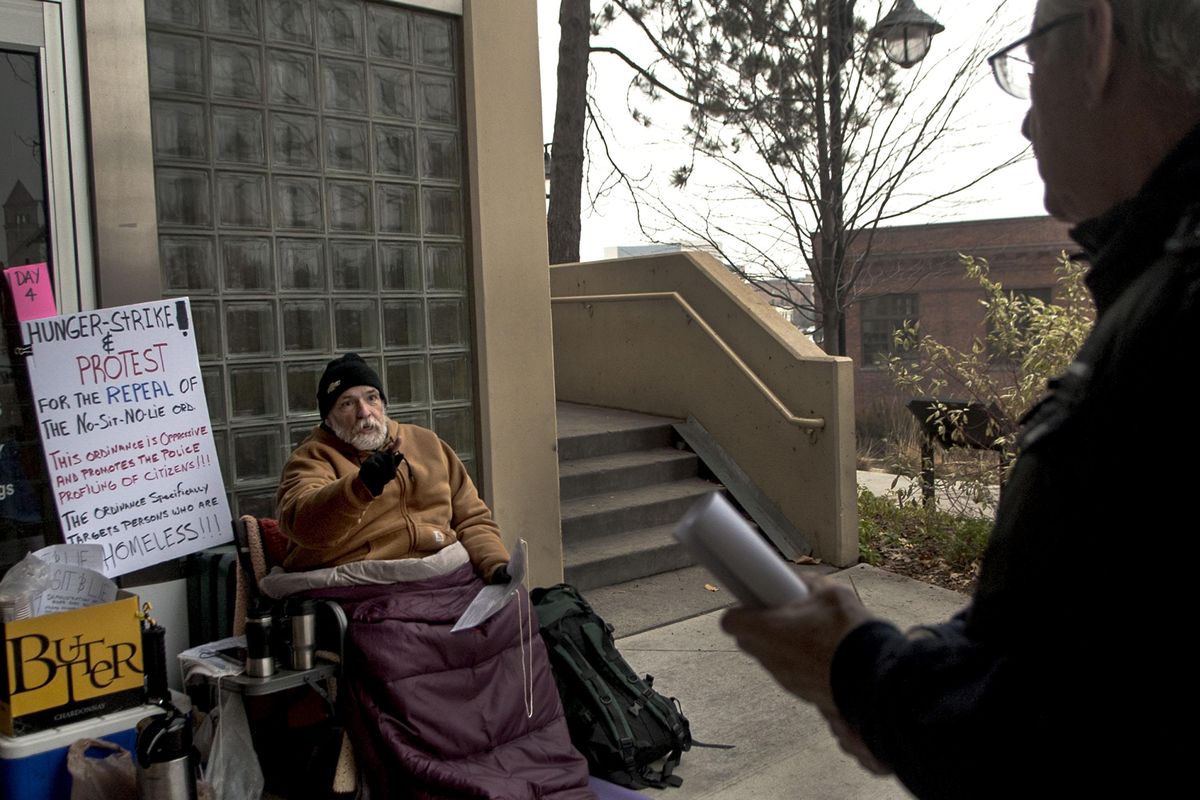As one-man hunger strike continues, city lawmakers reexamine sit-and-lie ordinance

The Spokane City Council may re-examine a prohibition against sleeping or sitting on public sidewalks following a man’s hunger strike in front of City Hall.
The strike started Monday after Alfredo LLamedo, a frequent voice of dissent at City Council meetings, said during public testimony that he would continue his hunger strike outside of City Hall until the council repealed a law barring people from sitting or sleeping on public sidewalks during the day.
Critics of the law say it criminalizes homelessness and targets people who have nowhere else to go.
The ordinance is enforceable between 6 a.m. and midnight, and only when shelters have available space. People who are cited are sent to community court where they are directed to community resources.
The Inlander reported in September that 395 sit-and-lie citations issued to 240 people have been logged with Spokane Municipal Court since the law went into effect. More than half of those citations were issued this year.
Councilman Breean Beggs said the city has not been enforcing the ordinance because most of the available, counted beds have been full.
He said law enforcement’s ability to enforce the ordinance also depends on the person in question. When all beds at men’s shelters are full, but there are beds available at women’s shelters, the ordinance would not be enforceable against a man who was sleeping or sitting on the street. He said beds at shelters like Union Gospel Mission, which has religious requirements, also don’t count toward the available bed count.
The 9th U.S. Circuit Court of Appeals recently decided a case challenging a local lawbarring people from sitting or sleeping outside.
In September, the court ruled the city of Boise had violated several homeless residents’ constitutional rights when it enforced a law that banned people from sleeping on public property. In the court’s written opinion, itruled that the ordinance violated the homeless’ Eighth Amendment rights – which bar excessive fines, bail and cruel and unusual punishment – because people sleeping outside had nowhere else to go.
LLamedo, who has spent the past several nights in front of City Hall, and has only consumed broth, Gatorade and a protein drink a day, said he has been advocating against the ordinance since it was passed four years ago.
LLamedo’s ex-wife, Lisa LLamedo, said she and their children were concerned about Alfredo LLamedo, who has health issues. She said he was stubborn and would likely stay in front of City Hall until he got his point across, but she was afraid that by the time City Council took action, Alfredo LLamedo could develop health complications.
“I want him to get what he wants,” she said. “I just don’t want him to die in the process.”
Alfredo LLamedo said he underwent an assessment by the fire department, is examined by a retired nurse every day and has supporters dropping off warm clothing, bedding and drinks.
He said the ordinance dehumanizes the homeless and that the limited resources for people without shelter, experiencing poverty or with mental health issues should have been addressed years ago.
“They deserve just as much respect, dignity and worth as anybody else,” he said.
City Council President Ben Stuckart said he, Beggs and Councilwoman Kate Burke were considering asking the mayor to suspend enforcement of the law. Stuckart said the city shouldn’t be enforcing the law when warming shelters aren’t up and running yet.
“Right now, it’s freezing and we shouldn’t be enforcing sit and lie,” he said.
Beggs and Burke have separate ordinances which will go before the public infrastructure committee on Nov. 26. Burke’s ordinance would repeal sit and lie, as well as an ordinance barring camping on public sidewalks. Beggs’ proposal would narrowly tailor sidewalk restrictions making the law enforceable only if a person leaves less than a 36-inch path, the size of a wheelchair, for people to get by when occupying a sidewalk.
Burke said she has been working on her ordinance since the 9th Circuit Court decision regarding Boise’s law, but hasn’t been able to move it through committee yet. She said the city should focus on providing resources and not criminalizing people without shelter. She said she is also concerned that enforcing the law could lead to a lawsuit.
“We’ve seen Boise go through litigation,” she said, “and I’d rather not see us get sued.”